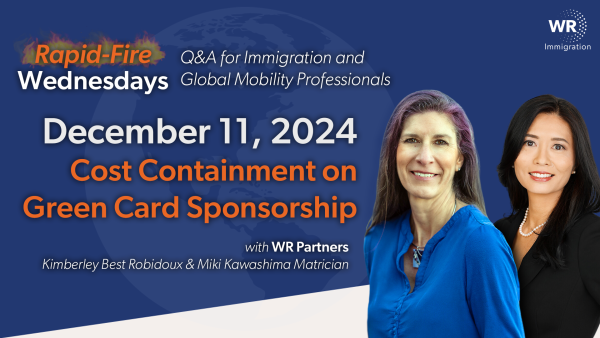The transcript version of our weekly Q&A livestream for corporate immigration professionals
By Kimberley (Best) Robidoux & Miki Kawashima Matrician
🔥 Question: What are the key trends in green card sponsorship policies under the potential impact of a Trump 2.0 administration?
Response: Companies are considering changes to their green card sponsorship programs due to concerns about increased costs and stricter regulatory scrutiny. Discussions with our benchmarking collective revealed that many global mobility professionals are reevaluating tenure requirements and cost containment measures. These trends highlight the growing need for strategic adjustments in green card policies.
🔥 Question: How does the benchmarking collective provide value to HR and global mobility professionals?
Response: Our collective gathers insights directly from professionals in the field rather than relying on third-party information. Members benefit from personalized benchmarking reports tailored to their company’s data. Roundtables, both virtual and in-person, foster robust discussions where professionals exchange ideas, share experiences, and build networks, making the community a valuable resource for addressing immigration challenges.
🔥 Question: What tenure requirements are common for initiating the green card process?
Response: Survey results showed that 37% of companies initiate the green card process on a case-by-case basis, while 24% start after 12 months of employment, and 13% each initiate after six months or immediately. Larger organizations tend to start the process sooner. Interestingly, 67% of respondents said their companies consider employee performance before initiating a case.
🔥 Question: How are companies managing costs associated with green card sponsorship?
Response: Cost containment measures are a significant focus. For example, 75% of companies cover premium processing costs for I-140 petitions, but some are reconsidering this policy due to rising costs. Discussions suggest that companies may limit premium processing coverage to cases with clear business needs, such as securing H-1B extensions. Repayment plans or cost-shifting models are also being explored, though 63% of respondents do not currently have such policies in place.
🔥 Question: What legal considerations should companies keep in mind regarding repayment policies?
Response: While repayment agreements for I-140 petitions and adjustment of status applications are permitted, employers cannot require employees to pay for fees associated with the PERM labor certification application. It’s crucial for companies to structure repayment agreements within these legal boundaries while addressing cost concerns.
🔥 Question: What are the strategies for supporting multiple green card pathways for employees?
Response: Many companies support multiple pathways, such as the PERM process alongside EB1 or EB2 national interest waivers. However, financial support for secondary processes is less common. In some cases, foreign nationals may self-pay for additional pathways while employers act as signatories for I-140 petitions. Promoting employees or revising roles can also create opportunities for pathway upgrades.
🔥 Question: How should global mobility professionals approach policy revisions in light of potential changes in 2025?
Response: Companies should monitor the evolving landscape and consider gradual policy adjustments. Anticipated increases in USCIS scrutiny and costs underscore the need for flexible strategies that balance cost control with employee support. Professionals may find it valuable to revisit their green card policies and evaluate how best to adapt to potential changes.
Send us your questions via DM or using the below link!
HR Question Submission Form | Rapid-Fire Wednesdays
See you next week!


